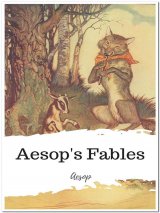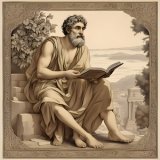Aesop's Fables Page #5
Aesop's Fables, or the Aesopica, is a collection of fables credited to Aesop, a slave and storyteller believed to have lived in ancient Greece between 620 and 564 BCE.
THE FLEA AND THE MAN A Flea bit a Man, and bit him again, and again, till he could stand it no longer, but made a thorough search for it, and at last succeeded in catching it. Holding it between his finger and thumb, he said--or rather shouted, so angry was he--"Who are you, pray, you wretched little creature, that you make so free with my person?" The Flea, terrified, whimpered in a weak little voice, "Oh, sir! pray let me go; don't kill me! I am such a little thing that I can't do you much harm." But the Man laughed and said, "I am going to kill you now, at once: whatever is bad has got to be destroyed, no matter how slight the harm it does." Do not waste your pity on a scamp. THE BEE AND JUPITER A Queen Bee from Hymettus flew up to Olympus with some fresh honey from the hive as a present to Jupiter, who was so pleased with the gift that he promised to give her anything she liked to ask for. She said she would be very grateful if he would give stings to the bees, to kill people who robbed them of their honey. Jupiter was greatly displeased with this request, for he loved mankind: but he had given his word, so he said that stings they should have. The stings he gave them, however, were of such a kind that whenever a bee stings a man the sting is left in the wound and the bee dies. Evil wishes, like fowls, come home to roost. THE OAK AND THE REEDS An Oak that grew on the bank of a river was uprooted by a severe gale of wind, and thrown across the stream. It fell among some Reeds growing by the water, and said to them, "How is it that you, who are so frail and slender, have managed to weather the storm, whereas I, with all my strength, have been torn up by the roots and hurled into the river?" "You were stubborn," came the reply, "and fought against the storm, which proved stronger than you: but we bow and yield to every breeze, and thus the gale passed harmlessly over our heads." THE BLIND MAN AND THE CUB There was once a Blind Man who had so fine a sense of touch that, when any animal was put into his hands, he could tell what it was merely by the feel of it. One day the Cub of a Wolf was put into his hands, and he was asked what it was. He felt it for some time, and then said, "Indeed, I am not sure whether it is a Wolf's Cub or a Fox's: but this I know--it would never do to trust it in a sheepfold." Evil tendencies are early shown. THE BOY AND THE SNAILS A Farmer's Boy went looking for Snails, and, when he had picked up both his hands full, he set about making a fire at which to roast them; for he meant to eat them. When it got well alight and the Snails began to feel the heat, they gradually withdrew more and more into their shells with the hissing noise they always make when they do so. When the Boy heard it, he said, "You abandoned creatures, how can you find heart to whistle when your houses are burning?" THE APES AND THE TWO TRAVELLERS Two men were travelling together, one of whom never spoke the truth, whereas the other never told a lie: and they came in the course of their travels to the land of Apes. The King of the Apes, hearing of their arrival, ordered them to be brought before him; and by way of impressing them with his magnificence, he received them sitting on a throne, while the Apes, his subjects, were ranged in long rows on either side of him. When the Travellers came into his presence he asked them what they thought of him as a King. The lying Traveller said, "Sire, every one must see that you are a most noble and mighty monarch." "And what do you think of my subjects?" continued the King. "They," said the Traveller, "are in every way worthy of their royal master." The Ape was so delighted with his answer that he gave him a very handsome present. The other Traveller thought that if his companion was rewarded so splendidly for telling a lie, he himself would certainly receive a still greater reward for telling the truth; so, when the Ape turned to him and said, "And what, sir, is your opinion?" he replied, "I think you are a very fine Ape, and all your subjects are fine Apes too." The King of the Apes was so enraged at his reply that he ordered him to be taken away and clawed to death. THE ASS AND HIS BURDENS A Pedlar who owned an Ass one day bought a quantity of salt, and loaded up his beast with as much as he could bear. On the way home the Ass stumbled as he was crossing a stream and fell into the water. The salt got thoroughly wetted and much of it melted and drained away, so that, when he got on his legs again, the Ass found his load had become much less heavy. His master, however, drove him back to town and bought more salt, which he added to what remained in the panniers, and started out again. No sooner had they reached a stream than the Ass lay down in it, and rose, as before, with a much lighter load. But his master detected the trick, and turning back once more, bought a large number of sponges, and piled them on the back of the Ass. When they came to the stream the Ass again lay down: but this time, as the sponges soaked up large quantities of water, he found, when he got up on his legs, that he had a bigger burden to carry than ever. You may play a good card once too often. THE SHEPHERD'S BOY AND THE WOLF A Shepherd's Boy was tending his flock near a village, and thought it would be great fun to hoax the villagers by pretending that a Wolf was attacking the sheep: so he shouted out, "Wolf! wolf!" and when the people came running up he laughed at them for their pains. He did this more than once, and every time the villagers found they had been hoaxed, for there was no Wolf at all. At last a Wolf really did come, and the Boy cried, "Wolf! wolf!" as loud as he could: but the people were so used to hearing him call that they took no notice of his cries for help. And so the Wolf had it all his own way, and killed off sheep after sheep at his leisure. You cannot believe a liar even when he tells the truth. THE FOX AND THE GOAT A Fox fell into a well and was unable to get out again. By and by a thirsty Goat came by, and seeing the Fox in the well asked him if the water was good. "Good?" said the Fox, "it's the best water I ever tasted in all my life. Come down and try it yourself." The Goat thought of nothing but the prospect of quenching his thirst, and jumped in at once. When he had had enough to drink, he looked about, like the Fox, for some way of getting out, but could find none. Presently the Fox said, "I have an idea. You stand on your hind legs, and plant your forelegs firmly against the side of the well, and then I'll climb on to your back, and, from there, by stepping on your horns, I can get out. And when I'm out, I'll help you out too." The Goat did as he was requested, and the Fox climbed on to his back and so out of the well; and then he coolly walked away. The Goat called loudly after him and reminded him of his promise to help him out: but the Fox merely turned and said, "If you had as much sense in your head as you have hair in your beard you wouldn't have got into the well without making certain that you could get out again."
Translation
Translate and read this book in other languages:
Select another language:
- - Select -
- 简体中文 (Chinese - Simplified)
- 繁體中文 (Chinese - Traditional)
- Español (Spanish)
- Esperanto (Esperanto)
- 日本語 (Japanese)
- Português (Portuguese)
- Deutsch (German)
- العربية (Arabic)
- Français (French)
- Русский (Russian)
- ಕನ್ನಡ (Kannada)
- 한국어 (Korean)
- עברית (Hebrew)
- Gaeilge (Irish)
- Українська (Ukrainian)
- اردو (Urdu)
- Magyar (Hungarian)
- मानक हिन्दी (Hindi)
- Indonesia (Indonesian)
- Italiano (Italian)
- தமிழ் (Tamil)
- Türkçe (Turkish)
- తెలుగు (Telugu)
- ภาษาไทย (Thai)
- Tiếng Việt (Vietnamese)
- Čeština (Czech)
- Polski (Polish)
- Bahasa Indonesia (Indonesian)
- Românește (Romanian)
- Nederlands (Dutch)
- Ελληνικά (Greek)
- Latinum (Latin)
- Svenska (Swedish)
- Dansk (Danish)
- Suomi (Finnish)
- فارسی (Persian)
- ייִדיש (Yiddish)
- հայերեն (Armenian)
- Norsk (Norwegian)
- English (English)
Citation
Use the citation below to add this book to your bibliography:
Style:MLAChicagoAPA
"Aesop's Fables Books." Literature.com. STANDS4 LLC, 2025. Web. 8 Jan. 2025. <https://www.literature.com/book/aesop%27s_fables_316>.




Discuss this Aesop's Fables book with the community:
Report Comment
We're doing our best to make sure our content is useful, accurate and safe.
If by any chance you spot an inappropriate comment while navigating through our website please use this form to let us know, and we'll take care of it shortly.
Attachment
You need to be logged in to favorite.
Log In